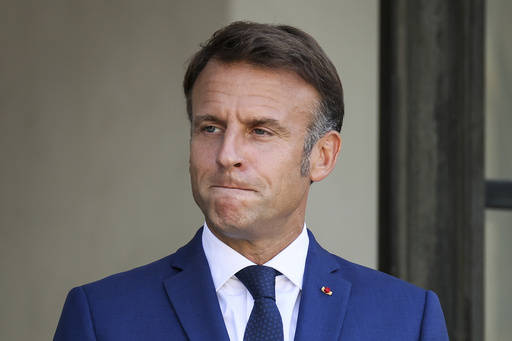In Nice, France, the main left-wing coalition has accused President Emmanuel Macron of undermining democracy by rejecting the New Popular Front’s candidate for prime minister after the recent inconclusive election. According to the French Constitution, as president, Macron has the authority to appoint the prime minister. The deadlock among French politicians over forming a new government has persisted since a legislative vote in July failed to produce a clear winner. Tensions have escalated with calls for major protests against Macron as Paris gets ready to host the Paralympic Games, with the opening ceremony scheduled for Wednesday evening.
The New Popular Front coalition secured the most seats in the National Assembly, followed by Macron’s centrist alliance and then the far-right National Rally, resulting in no single party holding a majority in France’s influential lower house of parliament. Nevertheless, the left-wing coalition, which comprises France Unbowed, the Socialists, and the Greens, argues that the new prime minister should come from their coalition since they are the largest group.
Macron recently turned down their nominee, Lucie Castets, a little-known civil servant, asserting that his decision aims to ensure “institutional stability,” as he believes a left-wing government wouldn’t get approval from the divided parliament. He has initiated another round of consultations with political leaders, urging the left-wing parties to collaborate with other factions, including his centrist alliance. Leftist leaders have criticized Macron, accusing him of jeopardizing French democracy and disregarding the election results.
The Socialists and the Greens declined to meet with Macron for further talks on Tuesday, while France Unbowed leaders were not invited to the Elysee presidential palace, prompting them to call for widespread protests against Macron, whom they hold responsible for a concerning situation. The Green party leader expressed disbelief in the denial of democracy and emphasized that they would reject any government that is not left-wing.
The fractured opinions on the left were apparent as the Socialist Party’s secretary-general hinted at openness to more discussions with the president, expressing concerns over Macron’s decision but refraining from calling for immediate street protests. Macron is not bound by any rule to appoint a candidate from the party with the most seats, and there is no specific deadline for his decision, marking an unprecedented absence of a dominant political bloc in French recent history.
Macron’s office announced that he would select a prime minister through consultations aimed at forming the broadest and most stable majority possible. Various politicians from different political spectrums have indicated their resistance to a government involving France Unbowed members, while Macron seems inclined towards a coalition comprising individuals from the center-left to the traditional right. Speculated potential candidates for the prime ministerial position include Bernard Cazeneuve, Xavier Bertrand, and Michel Barnier. Macron had previously announced that he would retain the outgoing centrist government temporarily to manage day-to-day affairs, particularly during the Paris Olympics that concluded on August 11.


